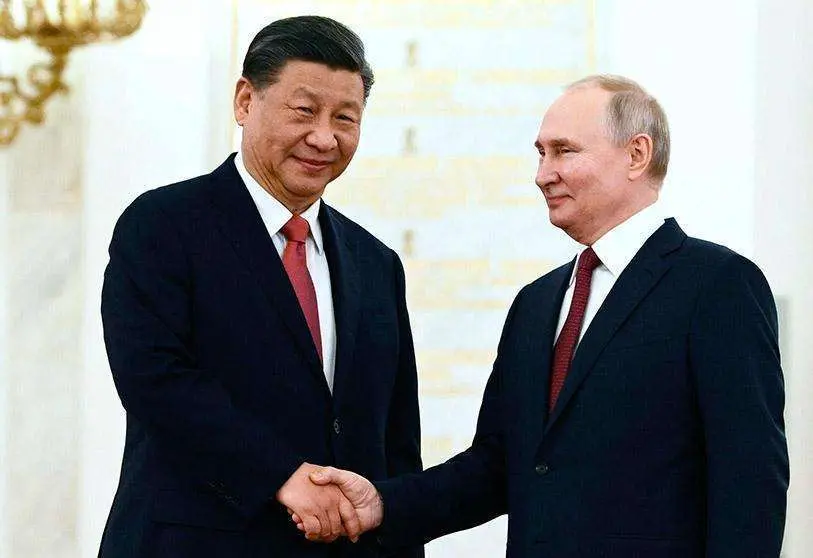When autocracies meet

China has not quite found its place in the world. Its closeness to Russia is an inevitably strategic pact that threatens to take its toll at some point in the 21st century, because it forces the Asian giant to position itself in the bloc of pariah governments, and that has nothing to do with, clearly, leading the global village.
In the most recent meeting between Chinese President Xi Jinping and his Russian counterpart Vladimir Putin, both have patted each other on the back, believing that the world is against them, and amid this animosity they seek to unite and feed off each other: Jinping has even wished Putin to be elected (again) next year because his leadership is "necessary" for the Russians.
At the age of 70, Putin has held the posts of president and prime minister of the Russian Federation since 2012, accumulating twenty years in power, and in 2024 he could be re-elected for another six years.
The same as Jinping (one year younger than Putin) who assumed all the powers of his country, since 2013, becoming the totem of the Communist Party of China, top military leader and president of the nation. His re-election last March will allow him to rule until 2028 when he will be 75 years old.
Let's say they come from the same generation, although from different cultures and ideologies that on the one hand converge and on the other not so much, international circumstances have been leading them to cement a relationship in which although Putin always praises Jinping, elevating him to the level of "his best and closest friend", the reality is that everything is a perpetual power game.
Jinping's visit to Moscow is considered strategic and momentous because of the significance of everything that surrounds it: both powers have critical frictions with the United States and most NATO member states; one of them has been invading Ukraine for a year; both face various types of international sanctions; both are ambitious leaders who undermine democratic values and human rights. Both seek a new world order with greater weight of their political, economic and military decisions. On top of this, both countries have territorial disputes in their respective spheres of influence.
Jinping has arrived in Russia following the announcement by the International Criminal Court (ICC) to issue an arrest warrant against the Russian dictator, accused of war crimes; specifically, for deporting Ukrainian children to Russia.
A lawsuit filed at the time by the Ukrainian president, Volodymir Zelenski, who went so far as to denounce a group of "200,000 children" in this situation, but finally the Court based in The Hague, Netherlands, recognised the abduction of 16,000 Ukrainian children.
Some see this ruling as a moral victory and yet another way of embarrassing both Jinping and Putin, because the Chinese leader continues to side with the bloc of autocracies and his main ally is now a dictator with an international arrest warrant.
The three-day meeting in Moscow had several purposes, one of them very relevant: to discuss the Chinese dignitary's twelve-point peace proposal on the Russian invasion of Ukraine. A war occupation that has been going on for more than a year and in which China has never condemned the Russian outrage, neither openly nor in the UN General Council's rounds of sessions.
From Beijing, Jinping flew out in a negotiating mood after a historic mediation between Saudi Arabia and Iran that has gone almost unnoticed in much of the Western media. However, given the importance of what happened, it did not go unnoticed by Washington, which sees how its Saudi partner is now a mere mirage.
On 10 March, a communiqué signed by the foreign ministers of China, Israel and Saudi Arabia announced "the resumption of diplomatic relations and the reopening of embassies in Tehran and Riyadh within two months".
Since 2021, there had been rumours that Beijing had been mediating between the two arch-enemies who have been at loggerheads since 1979 over control of the Middle East, and while international eyes are on Ukraine, it has finally been possible to re-establish relations.
For Jinping, this represents a major diplomatic success in a region such as the Middle East, which has been a source of destabilisation for decades, with multiple confrontations between regional countries and bitter neighbourly relations.
For China, it seems fundamental to its New Silk Road strategy that the Middle East should be a stable and predictable region. Since the departure of NATO troops from Afghanistan on 30 August 2021, much has moved in the Middle East, but no one expected that the historical struggles between Shia (Iran) and Sunni (Saudi Arabia) could be set aside because their opposing interests also drive the wars in Syria and Yemen.
What Jinping has not been able to unblock is Russia's invasion of Ukraine and it remains a bad omen, because Putin has no intention not only of backing down, but of renouncing the greed of seizing foreign territories.
His alliance with Jinping emboldens him further and here China is beginning to become the plaything of a shrewd and calculating Putin. Jinping is losing sight of him because of his interest in cheap Russian oil and gas - a big mistake.

